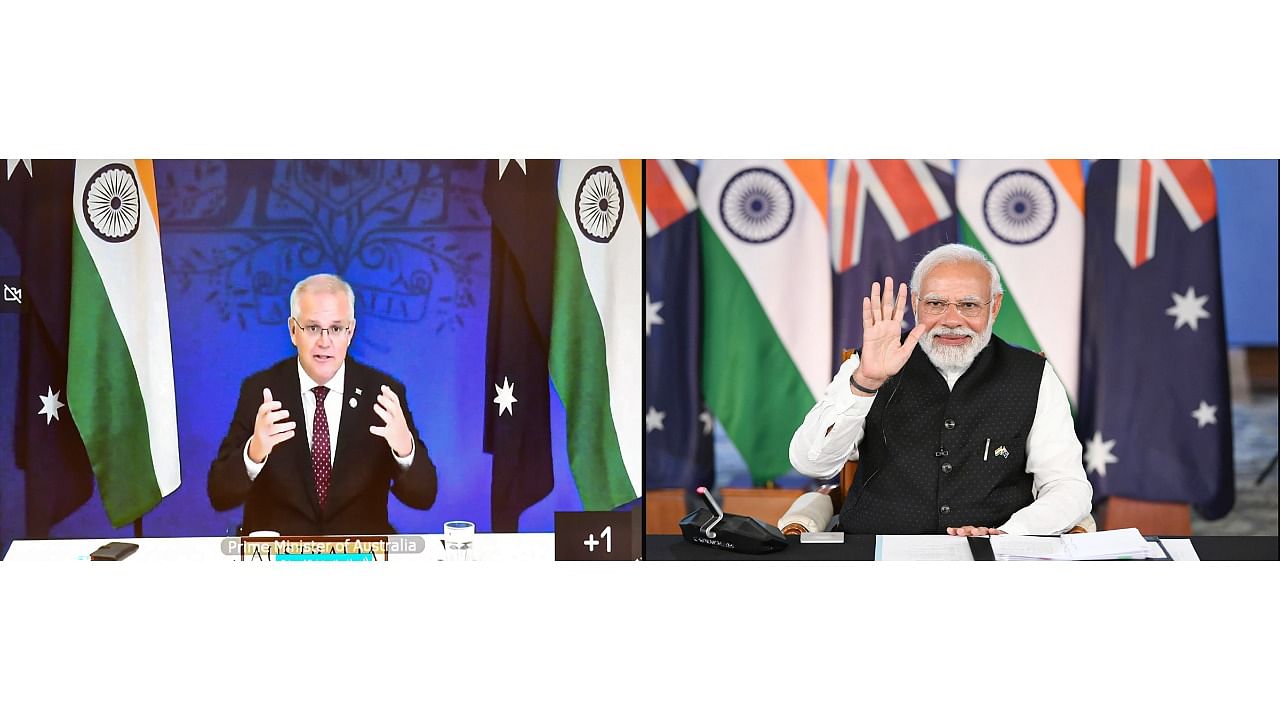
India and Australia on Monday agreed that the Russia-Ukraine conflict should not divert their attention from dealing with the belligerence of China in the Indo-Pacific region.
Prime Minister Narendra Modi and his Australian counterpart Scott Morrison had a virtual summit. Apart from reviewing the bilateral relations between the two nations, they exchanged views on both Russia’s military operations in Ukraine and China’s aggression against India along the Line of Actual Control between the two nations and against other countries in the Indo-Pacific region. Morrison termed Russia’s invasion of Ukraine as “unlawful” while making a statement at the beginning. Modi, however, refrained from making any comment on the issue during the open session of the summit, thus sticking to New Delhi’s persistent policy of avoiding any direct criticism of Russia, in view of the long-standing strategic partnership between the two nations.
“There was a great deal of comfort in the fact that both of us (India and Australia) saw the fact that the conflict in Europe should not be a reason for us to divert our attention from the Indo-Pacific region, and that our position, as far as the Quad is concerned, also was on similar lines,” Foreign Secretary Harsh Shringla told journalists after the summit.
Modi had the video call with Morrison just two days after he hosted Japanese Prime Minister Fumio Kishida for an in-person summit in New Delhi. Though Kishida nudged Modi to take a tougher line on Russia’s invasion of Ukraine, Morrison expressed “understanding” of New Delhi’s cautious approach and its policy of avoiding criticism of Putin. “He (Morrison) also, I think, expressed understanding for India's position on the issue of Ukraine, which he felt definitely reflected our own situation, our own sort of considerations,” said Shringla.
The summit between Modi and Kishida saw India subtly changing its position and joining Japan in assessing the implication of Russia’s military offensives in Ukraine on the Indo-Pacific region. New Delhi had earlier rejected the argument put forward by the United States that if Russia could get away with its aggression against Ukraine, it would encourage China to ratchet up its belligerence against India as well as against its maritime neighbours in the Indo-Pacific region.
India had the back-to-back engagements with Japan and Australia just days after a virtual summit of the Quad convened by the United States President Joe Biden had exposed the differences within the four-nation coalition over the Russia-Ukraine conflict. New Delhi had argued during the meeting of the four leaders that the Quad should continue to focus on countering China in the Indo-Pacific region and resisted the US bid to get the coalition to formally condemn Russia’s military offensives against Ukraine. Though Australia and Japan had supported the US, India had stonewalled inclusion in the joint statement, which had been issued after the summit, inclusion of any direct condemnation of Russia for its military operations in Ukraine.
Shringla said that Modi and Morrison had on Monday referred to the discussion at the March 3 summit of the Quad, where the leaders had a fairly clear perspective that the situation in Ukraine should not impact the Indo-Pacific region and that the focus and priority for the Quad and for our countries should continue to remain on the region as they were.
The Australian Prime Minister was “quite clear” that as far as he was concerned, the Quad’s focus was on the Indo-Pacific, added the Foreign Secretary.
Modi shared with Morrison India’s view about the two-year-long military stand-off along its Line of Actual Control (LAC) with China in eastern Ladakh. The Prime Minister emphasized that peace and tranquillity in the border areas was an essential prerequisite for normalization of relations between India and China, Foreign Secretary said, adding that the Australian Prime Minister also shared his perspective of how he saw China and its actions in the region, particularly in the South China Sea.
Watch the latest DH Videos here:
